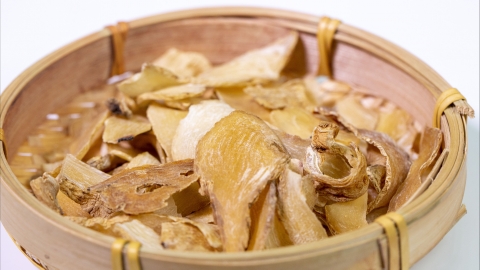Which six types of people should not consume Tianma (Gastrodia elata)?
Generally speaking, there is no established saying that "there are six types of people who shouldn't consume Gastrodia (Tianma)." However, individuals allergic to Gastrodia, those with Qi and blood deficiency, those with Yin deficiency and internal heat, pregnant women, infants, and young children are advised not to consume Gastrodia. Detailed explanations are as follows:
1. Individuals allergic to Gastrodia: After consuming Gastrodia, the immune systems of these individuals may mistakenly identify components within Gastrodia, triggering an allergic reaction. Common symptoms include skin rashes, itching, and hives. Some individuals may experience dizziness and nausea, while in severe cases symptoms such as laryngeal edema and breathing difficulties may occur, posing a threat to health.

2. Individuals with Qi and blood deficiency: The primary function of Gastrodia is to calm the liver and extinguish wind; it does not have the effect of nourishing Qi and blood. Those with Qi and blood deficiency already have weak bodily functions. Consuming Gastrodia will not improve their condition of Qi and blood insufficiency and may instead affect the body's balance due to its medicinal properties, worsening symptoms such as fatigue, pallor, and low spirits, which is unfavorable for recovery.
3. Individuals with Yin deficiency and internal heat: Common manifestations of Yin deficiency and internal heat include dry mouth and throat, warm palms and soles, and night sweats, which indicate insufficient body fluids and internal disturbance by deficient heat. Gastrodia has a relatively warm nature and lacks nourishing Yin effects. Consumption may intensify internal heat, exacerbating symptoms of Yin deficiency and internal heat, thus affecting bodily equilibrium.
4. Pregnant women: Pregnant women have a unique physical condition, and Gastrodia has certain medicinal properties that may affect fetal development through the placenta. Particularly during early pregnancy, when the fetal organs have not fully developed, consuming Gastrodia may increase the risk of fetal developmental abnormalities and may also stimulate the uterus, posing potential risks to both maternal and fetal health. Therefore, pregnant women are advised against consuming Gastrodia.
5. Infants and young children: The digestive systems and organs of infants and young children are not yet fully developed, and their ability to metabolize and tolerate medications is weak. The medicinal properties of Gastrodia may place additional strain on their bodies, leading to discomfort such as indigestion and diarrhea, and may even affect their normal growth and development. Therefore, it is not recommended for infants and young children to consume Gastrodia.
The above-mentioned groups should clearly understand their contraindications to avoid physical discomfort caused by consuming Gastrodia. Other individuals should also follow medical advice and control the dosage when consuming Gastrodia, avoiding long-term or excessive self-administration to ensure medication safety.




